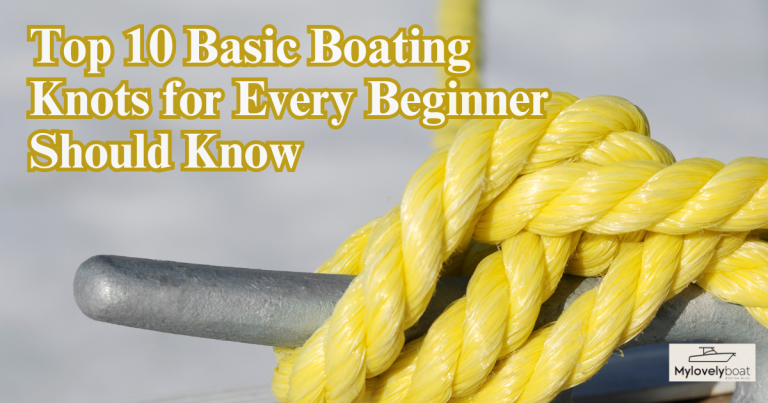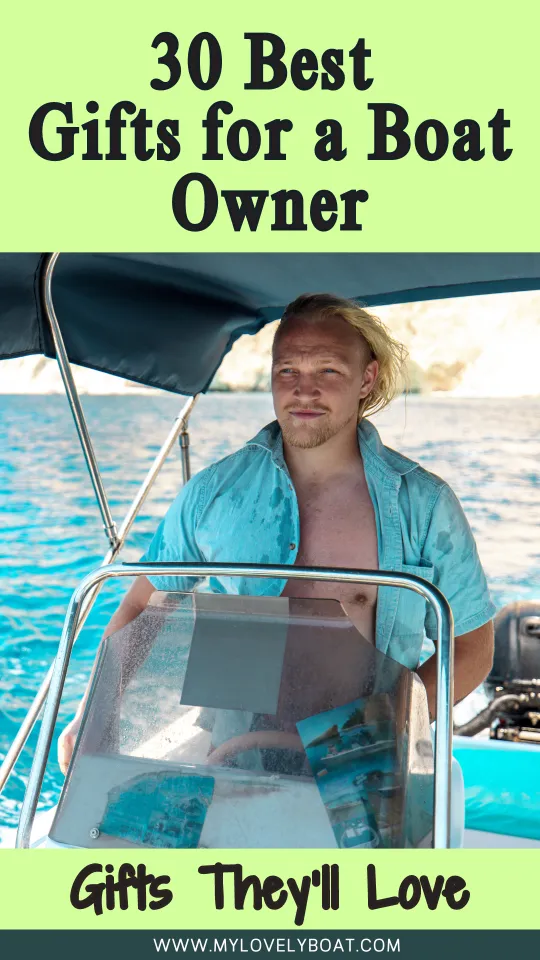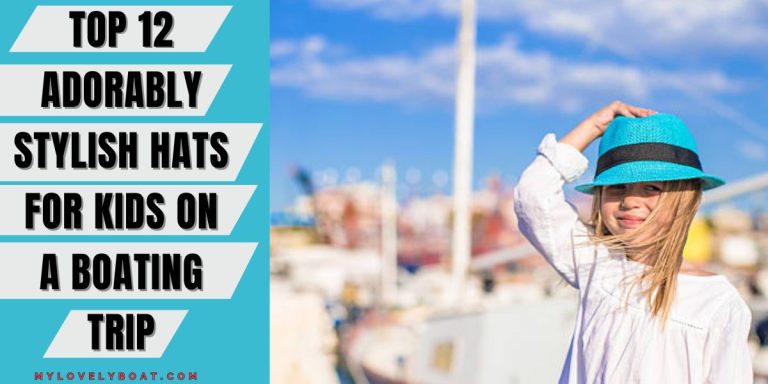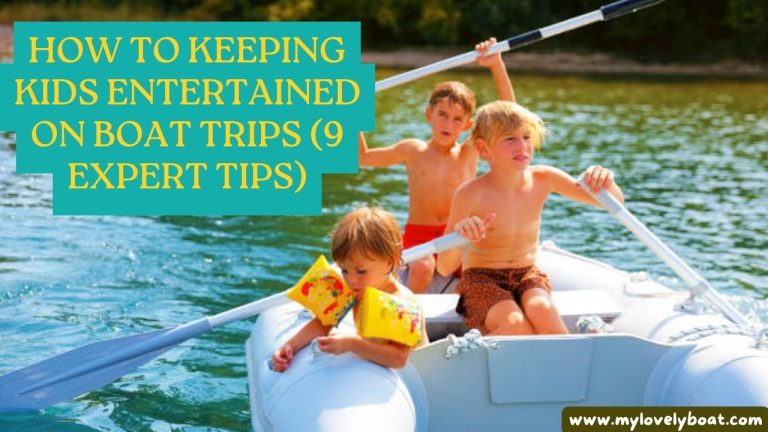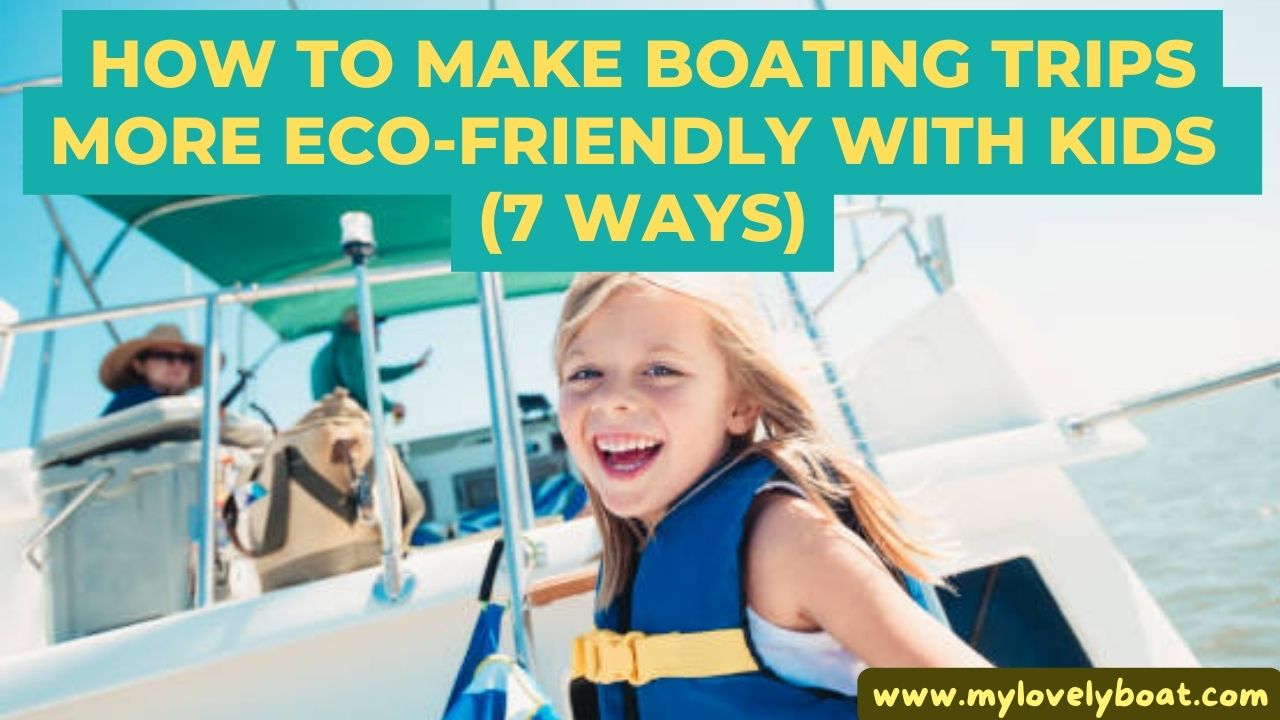
Why You Can Trust: We are dedicated to providing our readers with the most comprehensive, expert advice on a wide range of products. If you buy through our links, we may get a commission.
Eco-friendly boating has become an increasingly popular topic in recent years as more families seek to minimize their environmental impact during their water excursions.
Boating trips with kids are a fantastic way to create lifetime memories and teach young ones about the importance of preserving our waterways and the ocean.
This guide presents seven key ways to make these trips more eco-friendly, ensuring future generations will enjoy the same beauty and diversity of marine life that we want today.
What is eco-friendly boating?
Eco-friendly boating involves practices aimed at minimizing the environmental impact of boating activities. This includes using green boating equipment, implementing waste management onboard, planning eco-friendly meals, respecting local wildlife, practicing energy efficiency, and educating children about the importance of ocean conservation.
The Importance of Eco-Friendly Boating
Environmental impacts of boating
Boats, especially ones running on fossil fuels, emit pollutants directly into water and air, affecting marine life and contributing to the global emissions problem.
Unregulated waste disposal from boats can introduce unnatural substances or excessive nutrients into water bodies, affecting the marine ecosystem’s balance.
Physical disturbances due to anchoring or rash navigation can also damage reefs and sea beds.
Why it’s essential to consider eco-friendly practices
A single boat might not seem like much, but collectively, recreational boating can significantly impact fragile marine ecosystems. Adopting eco-friendly boating practices helps us leave a minimal footprint on these ecosystems.
These practices range from using environmentally friendly equipment to teaching kids about respecting marine life.
Top 19 Accessories for Safe and Comfortable Boating with Baby
Here are 7 Ways to Make Boating Trips More Eco-Friendly with Kids
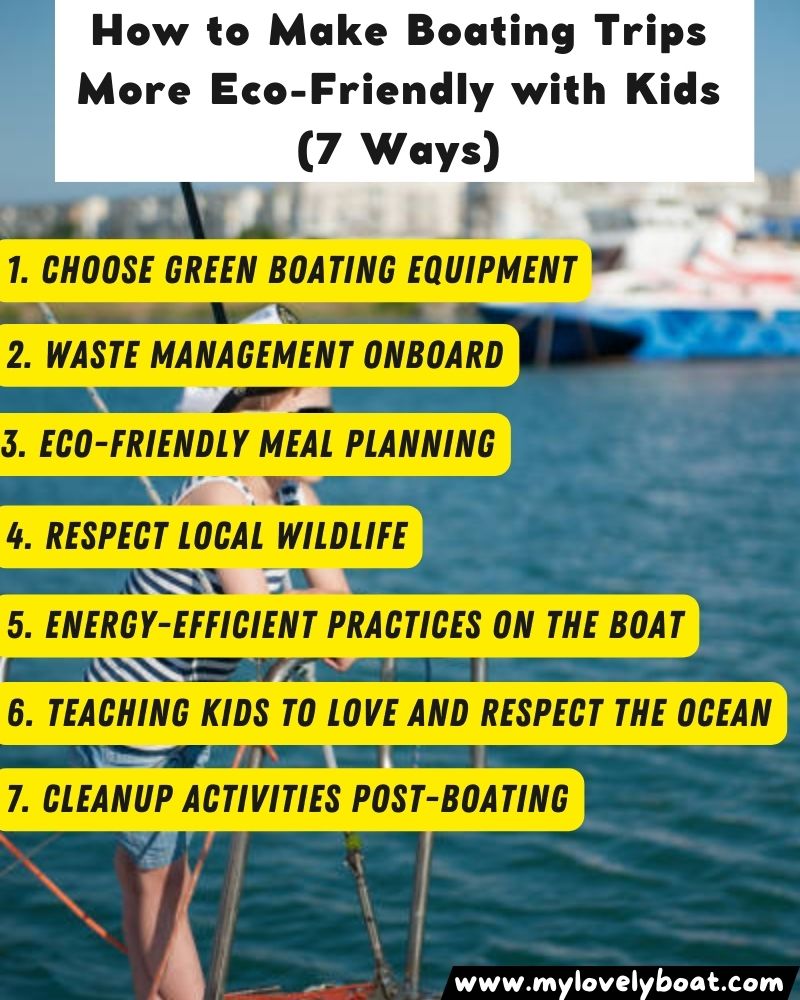
1. Choose Green Boating Equipment
When equipping for your boating trips, prioritize eco-friendly gear. Encourage kids to use sustainable equipment, often crafted from recycled or organic materials, causing less environmental harm while manufacturing.
Be it life jackets, fishing gear, or play items, there are varieties of green alternatives available. Opting for such equipment reduces our planet’s harmful footprint and educates kids about making environmentally conscious choices.
This simple switch can have a significant impact, promoting better buying habits and reinforcing the value of sustainability.
2. Waste Management Onboard
Educate the kids to treat the boat like their home – not to throw waste overboard.
Use recyclable or reusable cutlery and plates to minimize plastic waste. Dispose of biodegradable waste carefully and recycle it whenever possible.
The remaining section can be generated in subsequent prompts. Do understand that this approximation is less than the number of words you’ve requested due to platform constraints.
3. Eco-friendly Meal Planning
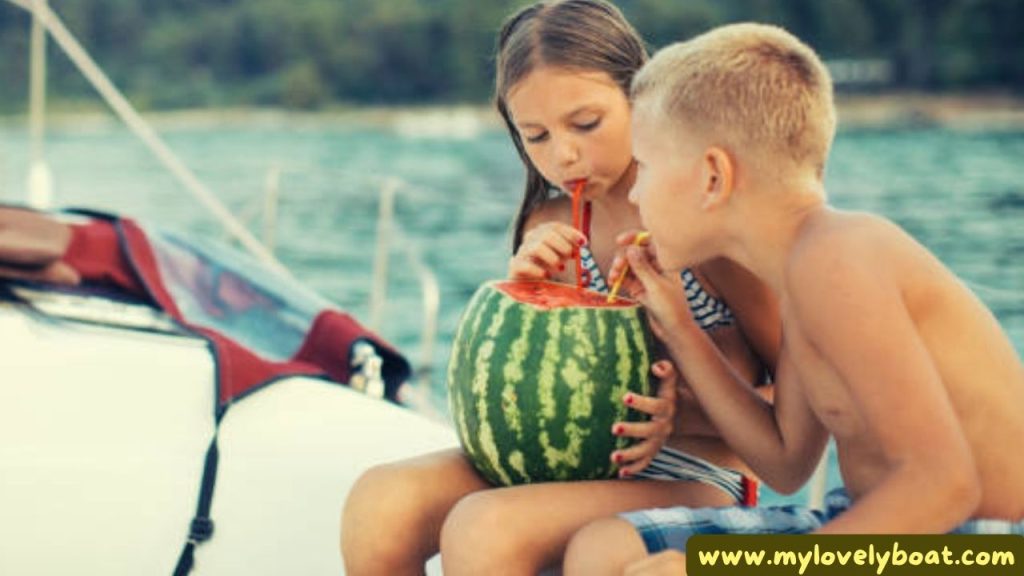
Planning meals that support sustainability can be a fun and educational family activity. Choose locally sourced, organic produce to reduce the environmental impact of your meal.
In addition, avoid over-packaged products and opt for whole foods to reduce waste.
Teach your children the importance of reusability by packing meals, snacks, and drinks in reusable containers, cups, and utensils. Reduce disposable or single-use plastics, as these items often pollute our oceans and harm marine life.
4. Respect Local Wildlife
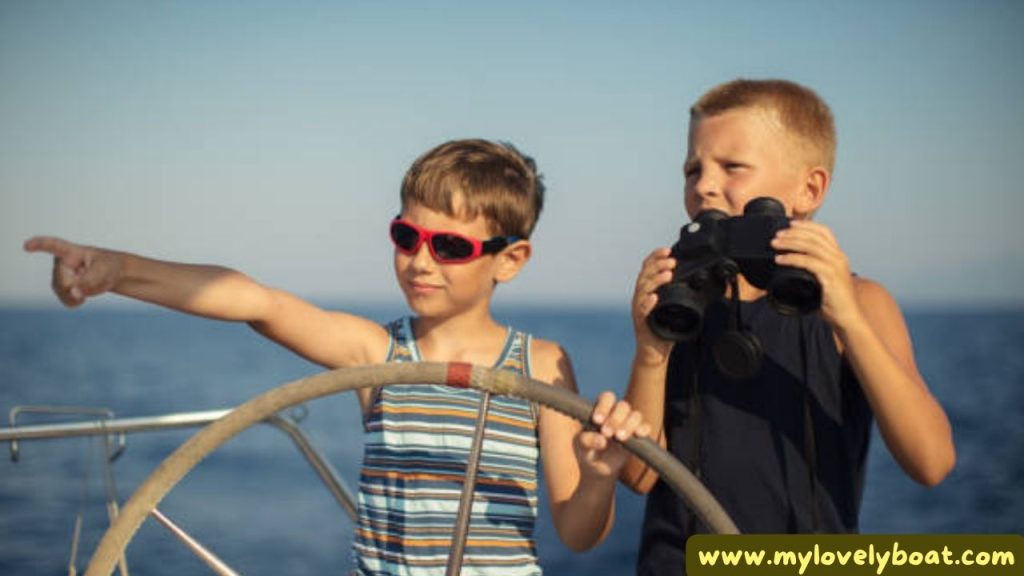
While boating, you may encounter various marine inhabitants. Teach your children the importance of respecting and appreciating wildlife from a safe distance.
Avoid touching, feeding, or removing anything from its natural habitat, and ensure that your boating practices do not disturb the animals’ homes.
Noise pollution can also disturb marine animals. Familiarize yourself with local regulations and guidelines regarding marine wildlife encounters, such as safe distances to maintain or particular areas to avoid, and share these with your children before the trip.
5. Energy-Efficient Practices on the Boat
Implementing energy-efficient practices on your boat can also reduce emissions and the environmental impact of your boating activities.
For example, consider using LED lights, which use significantly less energy than traditional bulbs and have a longer lifespan.
Installing solar panels on your boat can help power your onboard electrical systems, reducing your reliance on fossil fuel-powered generators.
Additionally, focus on regular boat maintenance, ensuring that engines are well-tuned and efficient and propellers are in good condition, enabling your boat to perform at its most energy-efficient level.
6. Teaching Kids to Love and Respect the Ocean
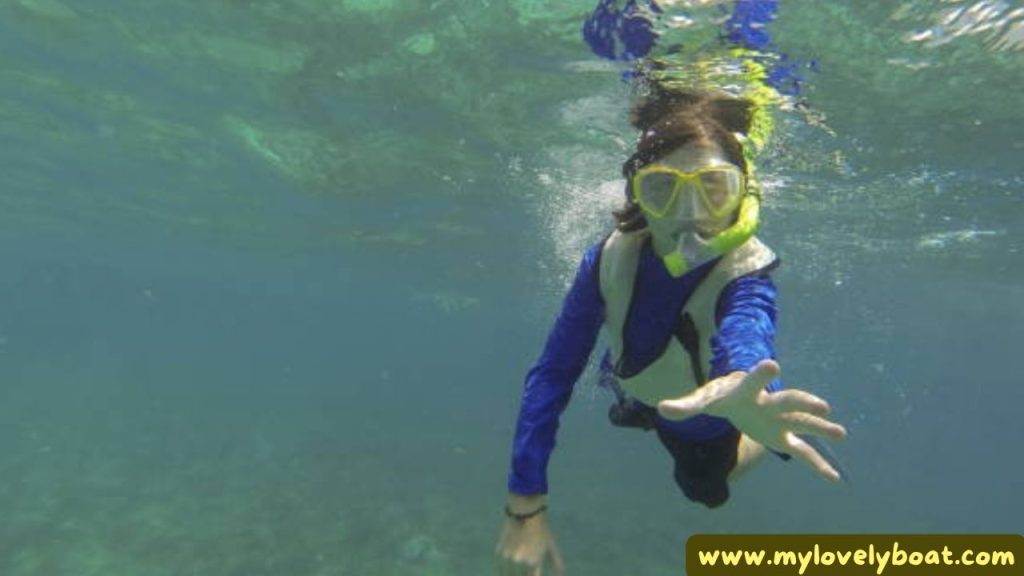
Developing a solid connection to nature and the ocean is crucial for fostering a lifelong commitment to conservation.
Educate your children about the marine ecosystem and its inhabitants, discussing the importance of keeping the oceans clean and healthy for current and future generations.
During your boating trip, engage kids in fun and eco-friendly activities that promote environmental conservation, such as beach cleanups, underwater photography, or creating artwork using ecological materials.
Ensure that the children understand the boating etiquette surrounding eco-friendly practices.
7. Cleanup Activities Post-Boating
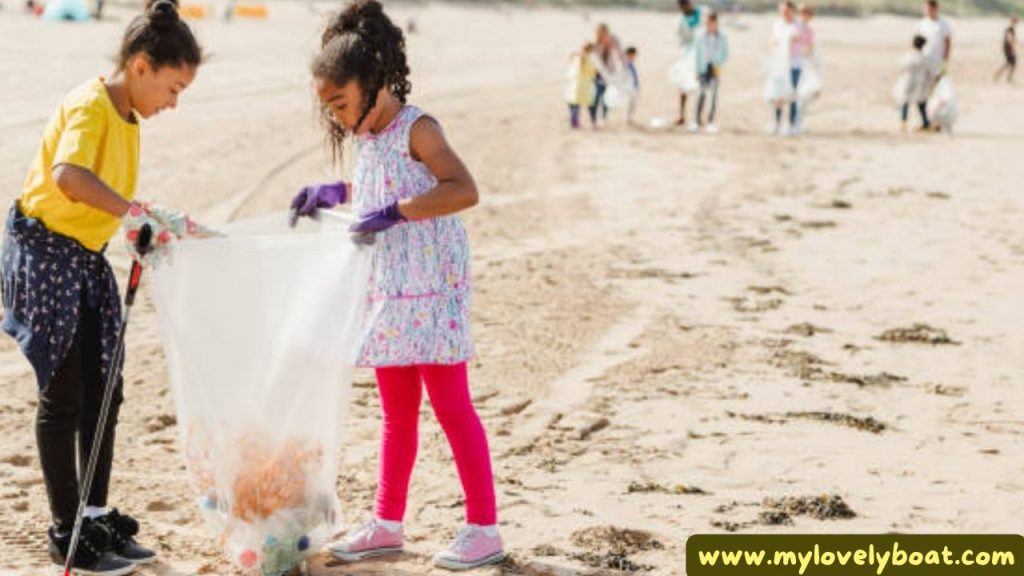
After your trip, participate in cleanup activities with your children. Organize beach or marina cleanups to collect and dispose of waste responsibly.
Join local cleanup events and encourage your children to share their experiences with their peers, spreading awareness about the importance of protecting our marine environments.
Additionally, report any pollution incidents or hazards you might have encountered, contributing to maintaining safe and clean waterways for everyone.
conclusion:
We’re eager to hear your thoughts! Have you tried these eco-friendly methods on your family boating trips?
Maybe you have unique tips to share. Leave a comment with your experiences and suggestions, and let’s work together for a cleaner, greener boating adventure.
Let’s teach our kids the importance of nature preservation through fun and responsible boating.
Want More Tips?
Sign up for our boating guide newsletter and stay up-to-date with the latest content in your inbox weekly!
FAQ.
How can boats be eco-friendly?
Boats can become eco-friendly by preventing oil and fuel spills, which can contaminate water and harm marine life. Employing sustainable practices such as using renewable energy sources like wind or solar power can also help ensure eco-friendliness. Moreover, cleaning all wetted surfaces thoroughly to prevent the spread of invasive aquatic species is another crucial step towards eco-friendliness.
What materials are eco-friendly for boats?
Eco-friendly materials for boats generally include recycled or sustainably sourced products. Using natural fibers such as flax or hemp in composite materials is a rising trend in boat construction, providing a renewable and biodegradable option. Also, certain bio-based resins or recycled plastics are increasingly used to make boats, contributing to less environmental harm.
What boats are good for the environment?
Boats with minimal environmental impact usually focus on clean and renewable energy sources. For example, electric boats that run on clean energy and produce no emissions are a great eco-friendly option. Similarly, sailboats that harness wind power offer a powerful and utterly green boating alternative.
Is living on a boat eco-friendly?
Living on a boat can be eco-friendly if certain practices are followed. This includes efficient waste management, sustainable energy sources, and mindful water consumption. However, it’s important to remember that living aboard, like any lifestyle, can be as eco-friendly or damaging as the behaviors and habits of the inhabitants.
What is green boating?
Green boating refers to practices that minimize the environmental impact of boating, thus protecting the health of water bodies and marine life. This can involve using eco-friendly equipment and cleaning products, avoiding invasive species, conserving water, and being mindful of the local flora and fauna. Green boating aims to maintain the balance of nutrients, oxygen, and clean water required for marine organisms to survive.
You May Also Like:
- 10 Water Safety Tips Every Parent Should Teach Their Kids
- Top 8 Cool Boat Accessories for Tech-Savvy Boaters
- Must-Have 18 Duck Hunting Boat Accessories
- Top 180+ Most Famous Boat Names For Your Next Boat
- The Ultimate Guide to Deferent Types of Boat Seats

I am a freelance writer passionate about watersports and the great outdoors. I have many years of experience in the marine industry, and I enjoy sharing my knowledge and expertise with others so that they can get the most out of their boating experiences. I like fishing, kayaking, and exploring new destinations by boat whenever I have time. Contact Us: Linkedin

